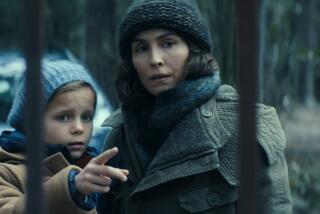Review: Fun and head games, terror and bloody revolt in ‘Westworld’s’ smart, action-packed season two
Humans, beware. When “Westworld” returns Sunday with its highly anticipated second season, the gun-slinging robot thriller does so with a vengeance. And you’re the target.
The mechanized hosts of this wild west theme park suffered every sort of humiliation, indignity and gruesome death imaginable last season (and the creators of this HBO series, Jonathan Nolan and Lisa Joy, have vivid imaginations). Now there’s a full-tilt rebellion across all sectors of the man-made park. And the myriad questions that caused this series to be such a mind-bender when it premiered in fall 2016 now play out across several storylines: Who’s controlling who? What constitutes free will? Is it the series that’s complicated, or am I just simple? Of course, there are a few new questions too.
This season, like the last time around the “loop” with this existential crisis of a cowboy sci-fi thriller, the unexplored terrain between our most basic impulses and highest levels of consciousness provide the perfect mental backdrop for a parable set in the lawless old/new west.
High-paying, hedonistic guests and the puppeteers who programmed their ghoulish entertainment are now the prey, making the season-two premiere, “Journey Into Night,” a smart, terrifying and action-packed study in what happens when the victims become the abusers.
The charge is led by those who suffered most at the hands of the park’s customers: the female hosts. Former saloon girl and brothel madam Maeve (Thandie Newton), who broke out of her narrative loop in season one and reprogrammed herself to be far more cunning than those who created her, is still bent on escaping Westworld.
But first she must find her “daughter,” the child programmed into her memory back when Maeve was assigned to a homesteader narrative. The girl was murdered or so goes the story that was meant to be erased from her memory. But Maeve knows all too well that death is only a temporary state for Westworld’s renewable hosts. Her daughter is out there, and with the help of her quick-draw love bot Hector (Rodrigo Santoro) and her power over the other hosts, she lays waste to all in her way.
Revenge is an uncomfortably satisfying pursuit here, especially when the male guests who abused and controlled the fabricated women of Westworld are subject to similar treatment. The park’s snarky writer and narrative director Lee Sizemore (Simon Quarterman) is one of the few humans Maeve spares on her bloody rampage because of his deep knowledge of the park and all its narratives. Before forcing him to accompany her back into the park to become a player in the games he wrote, she orders him to change from his fussy metrosexual garb into frumpy frontier wear.
Sizemore strips down to his boxers and socks. “All of it,” she commands. He’s mortified, then obeys and is rendered totally naked in front of her and the cameras. The vulnerability and degradation he suffers in those few seconds — even without the follow up of a leer, seduction, sex act or rape scene — puts a new spin on the countless times women are directed to do the same on screen as an expected part of the action / drama / comedy / any genre here.
Evan Rachel Wood’s sweet rancher’s daughter turned gunslinging terror Dolores leads a separate charge through the park to liberate her programmable peers from human control and then take her crusade beyond Westworld’s engineered borders. Is it the beginning of a robot revolution or, if she runs into Maeve, a civil war? Both formidable hosts have gained a higher consciousness than their peers, and a question keeps arising: Did this consciousness develop as a result of repeated experience, or is it a product of surreptitiously entered code? Dolores’ love interest and protector Teddy (James Marsden) hasn’t evolved in the same way, but he will do whatever she asks, and she’s asking for a lot of blood, so he’s beginning to feel the tug of something called a conscience.
Along with Newton and Wood, “Westworld’s” phenomenal cast, even without Anthony Hopkins in the season 2 premiere, makes the unbelievable believable. Jeffrey Wright (Bernard and Arnold) masterfully walks the line between his two precariously bound and conflicted characters, one wired and synthetic, the other flesh and blood. Jimmi Simpson now portrays the morality reversal of young William, while Ed Harris continues to terrify as older William, the obsessed version of the park’s largest-stake owner.
Music composer Ramin Djawadi is back repurposing modern pop hits into old-timey, player piano tunes, an artful trick that bridges the familiar with whatever future horror lies beyond each new stunningly beautiful bluff and canyon.
The series, based on the 1973 Michael Crichton film of the same name, teased the idea of samurai hosts in its season one finale, and they do show up in this season’s premiere. The role they’ll play is yet to be determined, but no doubt it will be awash in blood and guts and, of course, terror because like Wyatt’s hooded and horned assassins and a new faceless, engineered entity that is neither host or human, they are the stuff of nightmares.
But this is “Westworld,” where the grandest of fantasies and deepest of horrors are realized, and now, it’s the robots time to make their dreams — which of course are our dreams — come true. It’s poised to be a intellectually stimulating and emotionally bumpy ride, where the very concept of your existence becomes the stuff of high-brow entertainment and low-bar thrills.
More to Read
The complete guide to home viewing
Get Screen Gab for everything about the TV shows and streaming movies everyone’s talking about.
You may occasionally receive promotional content from the Los Angeles Times.







